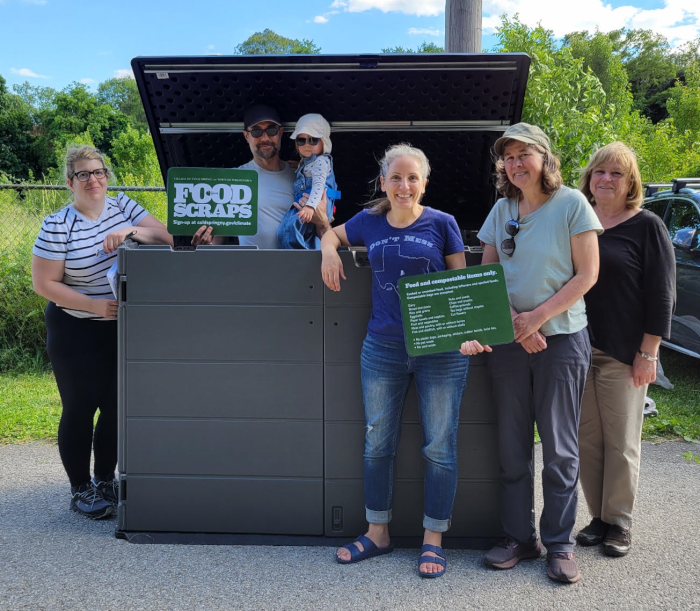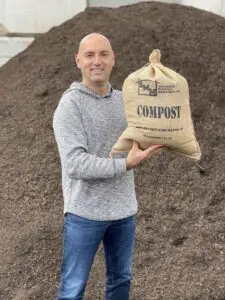Compost reduces greenhouse gases
When people trash their leftover salad, chicken bones, uneaten Brussels sprouts and other remnants of evening dinner, they likely don’t see themselves contributing to climate change. But they are, and the reason is basic.
Each year, 120 billion pounds of food are discarded in the U.S. According to the Harvard University School of Public Health, 95 percent goes to landfills. When that waste decomposes, it produces methane, a greenhouse gas that scientists say accounts for 30 percent of the increase in global temperatures.
Earlier this month, the Village of Cold Spring joined the Town of Philipstown’s fledgling food scrap program, becoming another of more than 700 communities nationwide that operate them, reaching 12 percent of U.S. households.
The Philipstown program, which began in 2022 as a project of its Climate Smart Task Force, is now collecting 1,000 pounds of household scraps each week, the equivalent of 26 tons per year.
Karen Ertl, a member of Philipstown’s Food Scrap Advisory Committee, said it researched programs across the country before selecting the Town of Scarsdale in Westchester County as a model. Michelle Sterling, a leader in the Scarsdale program, said it has composted more than 3 million pounds of scraps since 2017 and helped at least 50 other communities start programs.

“The reception from residents in every place we’ve helped has been overwhelmingly positive,” Sterling said. “People are so happy to have a municipally run program that allows them to recycle.”
Food scraps collected in Philipstown are processed at Sustainable Materials Management in Cortlandt Manor, which handles waste for more than 30 municipalities and produces 1,000 cubic yards of compost yearly.

Michael Fiumara, a compost operations specialist at the firm, said municipalities pay about $60 per ton to dispose of the scraps. The average fee at landfills in the Northeast is $84.44 per ton, according to a 2023 survey by the Environmental Research & Education Foundation.
Fiumara said the composting process includes mixing tree debris with the scraps and forcing air into the pile.
“Temperatures quickly rise to 160 to 170 degrees inside the pile, killing all weed seeds and pathogens,” he said. “Over the next 30 days, temperatures slowly decrease as the bacteria and microorganisms break down the food.” After another 30 days, the composted material is ready to be screened.
Fiumara said anaerobic conditions in landfills cause decomposing food to create methane, but Sustainable Materials Management’s process of forcing air into compost piles maintains an aerobic environment.
“When food scraps decompose aerobically, they produce carbon dioxide, water and heat, which is much better for the environment,” he said.
The environmental benefits of spreading compost in gardens, lawns and fields include improved soil structure and health, increased moisture and nutrient retention and carbon sequestration, he said.
Sustainable Materials Management sells its compost to landscaping companies, garden centers and the public. Towns also purchase it, often giving it back to residents as a thank-you for participating.
How to Recycle Food Scraps
Residents of Philipstown, including Cold Spring and Nelsonville, can join the program by registering at Town Hall at 238 Main St. and purchasing a $20 starter kit (checks only) that includes a countertop pail, storage/transport bin and compostable bags.
In Cold Spring, scraps can be dropped off from 8 a.m. to sunset on Tuesdays at a collection bin on Kemble Avenue between The Boulevard and the West Point Foundry Preserve. Scraps can also be left at the Philipstown Recycling Center on Lane Gate Road on Saturdays from 9 a.m. to 3 p.m. or on Saturdays at the Cold Spring Farmers Market at Boscobel.
All manner of food scraps can be composted, including fruits, vegetables, meat, fish, dairy, bread, rice, pasta, raw and cooked food, bones and seafood shells as well as cut flowers, napkins, paper towels, wax paper, pet food, tea bags, coffee grounds, Popsicle sticks and wine corks.
Plastic, metal, yard waste, pet waste, fruit stickers, baby/hand wipes and trash are not accepted. More information is available at climatesmartphilipstown.org.
In Beacon, residents can drop food waste in containers at the Beacon Recreation Center (23 W. Center St.), Memorial Park or the Churchill Street parking lot near Hudson Valley Brewery. The program does not accept “compostable plastics,” such as bin liners, bags, utensils or containers unless they are made of bamboo. To purchase supplies, see beaconny.myrec.com.
Community Compost Co. offers residential pickup in Beacon starting at $26 per month or $281 per year. The firm provides a 5-gallon bucket that is swapped out weekly or biweekly. Customers also receive free compost twice a year. See communitycompostco.com.
Although Beacon residents can pay for curbside food-scrap pickup from a private company, Ertl said Philipstown has not pursued that option. “So much of what we hope to do is related to education,” she said. “With curbside pickup, education about waste reduction, composting, recycling, greenhouse gas emissions and sustainability tend to become less important; it’s just not the same experience.”
In Cold Spring, Village Trustee Laura Bozzi, who serves on Philipstown’s Climate Smart Task Force, said 233 households in Philipstown have signed up for the food-scrap recycling program, which is supported by a state grant.
“We have funding for the Cold Spring drop-off site until year-end,” she said. “After that we’ll have to see what’s possible and to continue if it’s a success.”


This is a wonderful initiative. The compounding effect of everyday, individual actions to mitigate global warming cannot be overstated. It takes a village. Thank you!
We are so excited about this convenient Kemble Avenue drop. Walk your dog and drop your compost. [via Instagram]